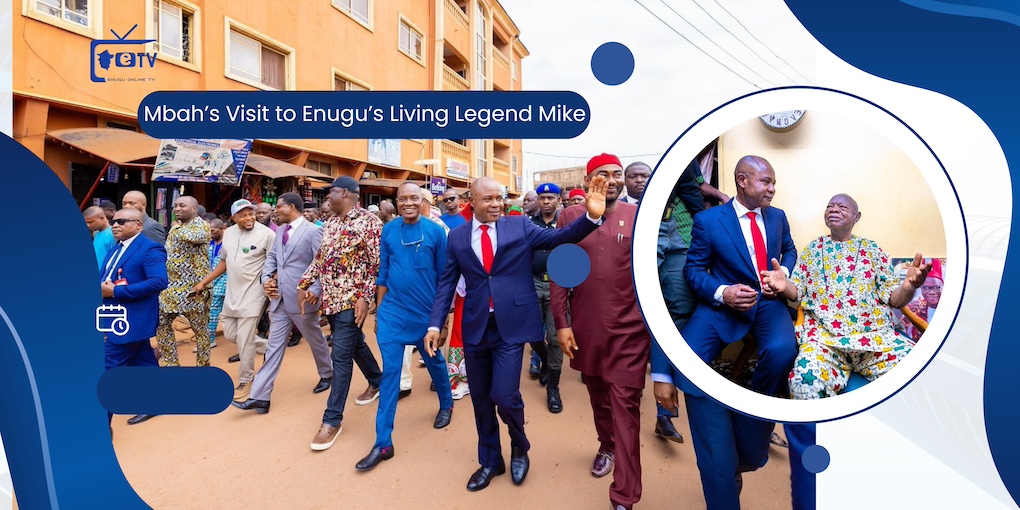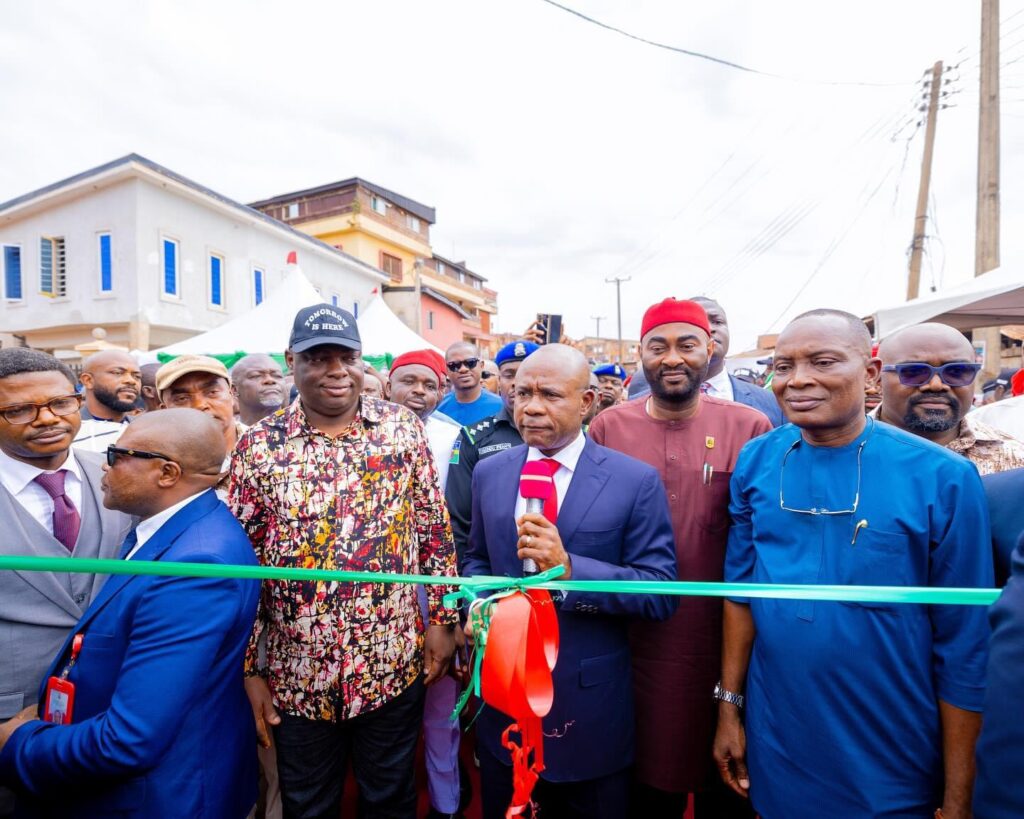
Honoring Cultural Heritage: Governor Peter Mbah’s Visit to Enugu’s Living Legend Mike Ejeagha
In a heartfelt gesture that underscores the importance of cultural preservation and community development, the Governor of Enugu State, Dr. Peter Mbah, recently paid a visit to one of the state’s living legends, Mike Ejeagha. Known for his profound impact on the cultural tapestry of Enugu, Mike Ejeagha has been a beacon of traditional music and storytelling for decades. In addition to honoring Ejeagha, Governor Mbah also commissioned four newly constructed and reconstructed roads in the Abakpa Nike area. This dual-purpose visit not only celebrated a cultural icon but also underscored the state’s commitment to infrastructure development.
Recognizing a Cultural Icon: Mike Ejeagha
Mike Ejeagha, a revered musician, and folklorist, has contributed immensely to the cultural heritage of Enugu State and Nigeria as a whole. His music, deeply rooted in the Igbo tradition, captures the essence of the people’s history, values, and beliefs. Ejeagha’s storytelling through folk music has preserved many traditional Igbo tales and has kept the language alive for younger generations. It is this immense contribution to cultural heritage that prompted Governor Mbah to rename Obinagu Road—leading to Ejeagha’s residence and reconstructed earlier in the year—as “Mike Ejeagha Road.”

The Governor Of Enugu Performing the Trending Dance “gwogwongwo”
This renaming is not just a symbolic act; it is a testament to the government’s recognition of the arts and culture as vital elements of Enugu’s identity. The road, now bearing Ejeagha’s name, serves as a physical reminder of the impact he has made in promoting and preserving the Igbo culture. For Ejeagha and his family, this is a significant honor that ensures his legacy will continue to inspire future generations.
The Importance of Honoring Cultural Heritage
Enugu State, rich in history and tradition, has produced numerous artists, musicians, writers, and scholars who have shaped the cultural and intellectual landscape of Nigeria. By honoring Mike Ejeagha, the government of Enugu State is sending a clear message about the importance of celebrating those who have played pivotal roles in shaping the cultural identity of the state.
Governor Mbah’s visit also included a commitment to support Mike Ejeagha’s upkeep, a gesture that speaks volumes about the administration’s dedication to preserving the legacies of indigenous legends. This act is part of a broader initiative to ensure that the contributions of cultural icons are not forgotten. By taking responsibility for Ejeagha’s wellbeing, the government is ensuring that he, and by extension, other cultural icons, are cared for and remembered.

The Governor’s actions highlight a broader cultural strategy for Enugu—one that sees culture not just as an aspect of the past but as a vital, living component of the community’s future. As Governor Mbah noted, “Enugu is a state rich in history, talent, and culture. It is our duty to honor and celebrate those who have shaped our identity.” This ethos reflects a deep understanding of the role of cultural heritage in fostering community pride and continuity.
A New Era of Infrastructure Development in Abakpa Nike
In addition to celebrating cultural heritage, Governor Mbah’s visit was also focused on infrastructural development. The commissioning of four newly constructed and reconstructed roads in Abakpa Nike marks a significant step in the ongoing efforts to improve the state’s infrastructure. These roads are not just essential for easing traffic and improving accessibility; they are crucial for economic development, providing better access to markets, schools, and health facilities.
The reconstruction and renaming of the road leading to Mike Ejeagha’s residence highlight the government’s commitment to balancing cultural preservation with modernization. By improving infrastructure in the area, the government is enhancing the quality of life for residents while also making the area more accessible to visitors who may want to pay homage to the legendary musician.
Governor Mbah reassured the residents of Abakpa and the entire state of Enugu that this is just the beginning. He announced that contracts have been awarded for the construction of 141 roads and 20 rural roads across the state, with Abakpa included in the plan. This ambitious plan is part of the broader vision to transform Enugu into a modern, well-connected state that can support its growing population and economy.

Future Plans for Enugu State
The future of Enugu State looks promising under the leadership of Governor Mbah, who has shown a strong commitment to both cultural preservation and infrastructural development. In his address, Governor Mbah outlined plans for further road construction, including the dualization of Penocks Junction on the Enugu-Onitsha Road, extending all the way to Opi-Nsukka. This project, for which the contract has already been awarded, is set to commence shortly and will significantly improve transportation within the state.
These infrastructure projects are more than just roads; they represent the lifelines of the community, facilitating trade, easing transportation, and connecting people. They are essential for economic growth and social development. Governor Mbah’s administration is focused on ensuring that every part of Enugu State, from urban centers to rural communities, benefits from these developments.
Commitment to Transforming Lives
Governor Mbah’s actions reflect a profound understanding that governance is about improving the lives of the people. Whether it’s through cultural recognition or infrastructural development, the goal remains the same: to create a better, more prosperous Enugu State. The recent developments are a testament to this commitment. By investing in both the cultural and physical infrastructure of the state, the government is laying a solid foundation for a future where the people of Enugu can thrive.

To the people of Abakpa and the entire Enugu State, Governor Mbah’s message is clear: this is just the beginning. With many more projects in the pipeline, the government’s dedication to transforming the state is unwavering. The roads and infrastructure being developed today will serve as the arteries of tomorrow’s vibrant, dynamic Enugu.
Conclusion
Governor Peter Mbah’s recent visit to Mike Ejeagha is more than a ceremonial honor; it is a statement of values. It reflects the administration’s commitment to recognizing and preserving the cultural heritage that defines Enugu State while simultaneously forging ahead with modern development. By balancing these two priorities, Governor Mbah is ensuring that Enugu remains a state that respects its past while eagerly embracing its future.
As Enugu continues to develop and grow, the recognition of its cultural icons and the improvement of its infrastructure will play a crucial role in shaping a future where tradition and progress coexist harmoniously. Governor Mbah’s actions are setting a precedent for what governance can look like when it is rooted in respect for heritage and a commitment to the people’s welfare. The people of Enugu can look forward to a future where their rich cultural history is honored, and their needs are met with a modern, responsive government.










